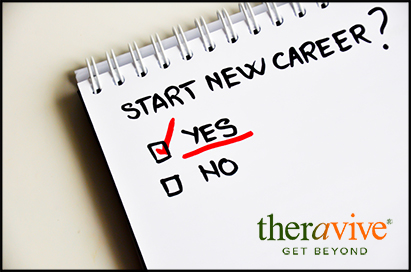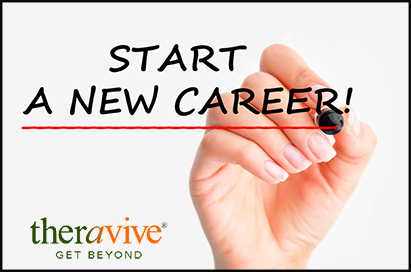 Are you considering a career change or in the midst of a career transition? No matter how urgent it feels to make a decision quickly, take some time to do some self exploration first. Your career is an investment in a large portion of your life. It's a good idea to line your next career up with what is important to you. While you may not get everything on your wish list, clarifying what is important can help tremendously in evaluating your options and making a decision on what's next.
Are you considering a career change or in the midst of a career transition? No matter how urgent it feels to make a decision quickly, take some time to do some self exploration first. Your career is an investment in a large portion of your life. It's a good idea to line your next career up with what is important to you. While you may not get everything on your wish list, clarifying what is important can help tremendously in evaluating your options and making a decision on what's next.
The Change Process
Before you begin planning your career change, it's helpful to understand the change process. Often, we set out transition plans and intentions only to hit obstacles along the way such as lack of motivation or feeling out of sorts. When you understand that this is a normal part of the change process, it can help you gain perspective and patience with the process.
Endings
The change process begins with an ending. If you’re in a career transition then you may have already experienced the ending, such as with a job loss. If you have experienced a job loss, then this may be especially true for you. The ending may also be part of your transition once you find a new career.
Endings are characterized by:
- - Shock
- - Denial
- - Anger
- - Depression
- - Bargaining
- - Acceptance
The Neutral Zone
The next phase in the change process is the neutral zone.
The neutral zone is characterized by:
- - Disorientation and confusion
- - Obsessive review; idealizing the past
- - Feeling out of sorts; strong emotions
- - Uncertainty regarding the self; more susceptible to outside influences
- - High energy, often undirected; tendency to false starts
- - Control; tighter effort to control, hold on to control
- - Self-doubt and loss of self-confidence
New Beginnings
The final phase is a new beginning and an optimistic view of the future. In this part of the change process, decisions have been made and confidence is restored.
As you can see in these stages, where you are right now is likely to be filled with unfamiliar or uncomfortable emotions. This is a normal part of the change process. It’s easy to feel overwhelmed and just listen to what others say you should do. However, this isn’t a good idea! This is YOUR career. Only YOU know what is best for you. Others can be helpful by providing information, referrals, and resources along the way. To gain greater confidence in the process, take time to explore your skills, strengths, desires, and values.
How Do I Change Careers?
Here are a few steps to get you started.
1. Know Yourself
Who are you, what skills and strengths do you have to offer and what is it you really want? These are aspects of yourself you should know fairly well before beginning the career change process. This will form your roadmap of what’s next in your career. You’ll use this information to guide your exploration as well as decision making process. Don’t hold back!
The goal is to lead from your strengths. Research shows that we are more likely to succeed when we lead from our what we are good at, rather than trying to repair our deficits and feature them. You’ll also be more knowledgeable, motivated and passionate when leading from your strengths in a career change.
Working with a career counselor can help you clarify these aspects of yourself. Career counselors have a variety of tools, exercises and powerful questions to help you clarify your strengths, values, and personality style. Getting feedback from others can also be very powerful.
 Create Your Ideal Job Description.
Create Your Ideal Job Description.
Here are some questions to ask yourself:
- - What energizes me most at work?
- - What are the tasks and projects I most want to be working on?
- - What skills and strengths do I most want to use?
- - What are the environments in which I’m at my best?
- - What are the values that I hold that need to be expressed and/or supported at work?
- - How do I prefer to be managed?
- - How important is on-going development in my work and how do I learn best?
3. Prioritize the skills and strengths you currently have that you’d like to use in your next career.
As with most things in life, you make a wish list then you have to prioritize. When making a career change, it’s easiest if you change one thing at a time (i.e. industry, functional area, company). To get to your long-term goal, you may need to move into an area that is not ideal for you, but serves as a stepping stone towards your long-term goals.
4. Explore Your Options
Once you’ve created a list of what is important to you, you’ll need to expand your options. In this stage of the process, it’s important not to limit yourself with yes, but’s or doubts such as, “I won’t get paid enough,” or “I don’t have enough training,” The key here is to expand your options wide. Afterwards, you’ll narrow them down. You never know which direction an idea might lead you.
For example, say the interests and strengths indicate that journalism might be a good fit and your values of adventure and curiosity suggest reporter. You might rule this out immediately thinking, “It’s too competitive,” “I don’t have the training,” or “I can’t leave my family and travel out of state.” These facts may be true, but in this stage, you’re only looking for clues. Your interest in journalism and reporting could eventually lead to you writing popular political commentary from home for a major network, with your values of family balance and security ranking higher. There are over 20,000 occupations and an even greater number of variations within each occupation. You never know where this exploration process will eventually lead you, so you want to start by casting a wide net.
The reality is that when you’re making a career transition, you’re evaluating each of the four areas above at all times. It doesn’t happen in a nice linear order. Regardless, it’s important to take some time to think through the questions as they will not only help you find your next career, but also assist in your decision-making process.
Help Finding a New Career
For help finding a new career, join our online group career coaching program, Create Your Inspired Career. Through the program, you will be guided through exercises and discussion to help you clarify your values, interests, strengths as well as your next career direction. The group coaching process is a powerful to learn from others and receive feedback about additional strengths in yourself. Click here to find out more information about the career coaching program.
Rachel Eddins is a Therapist and Career Counselor in Houston, TX. Rachel helps people find their inner worth, overcome emotional and food related issues and find meaning and purpose in both life and career.
About the Author
 Eddins Counseling Group, LPC
Eddins Counseling Group, LPCSometimes it can seem like everyone but you has it all figured out. The reality is that it just seems this way. Everyone faces struggles in their lives. When you feel stuck, dissatisfied, and overwhelmed or just don’t know what to do to feel better an outside perspective can help you get back on track. We are a team of Houston therapists, relationship counselors, and career counselors. Online therapy and career counseling via phone or video conferencing is also available.
Office Location:
5225 Katy Freeway, Suite 103
Houston, Texas
77007
United States
Phone: 8325592622
Contact Eddins Counseling Group
Eddins Counseling Group has a clinical practice in Houston, TX
Professional Website:
www.eddinscounseling.com